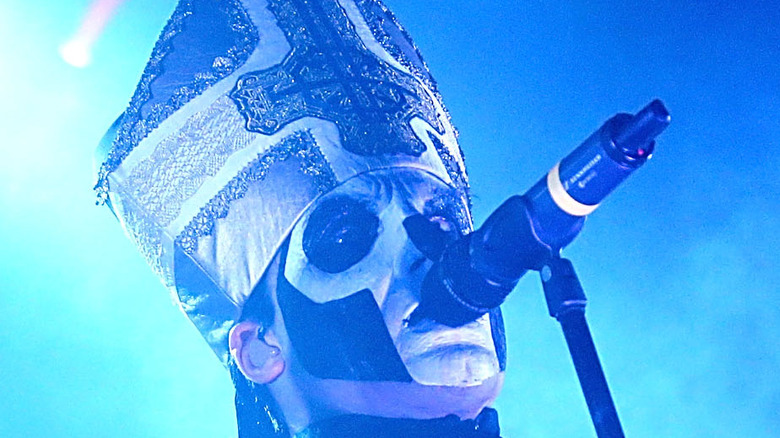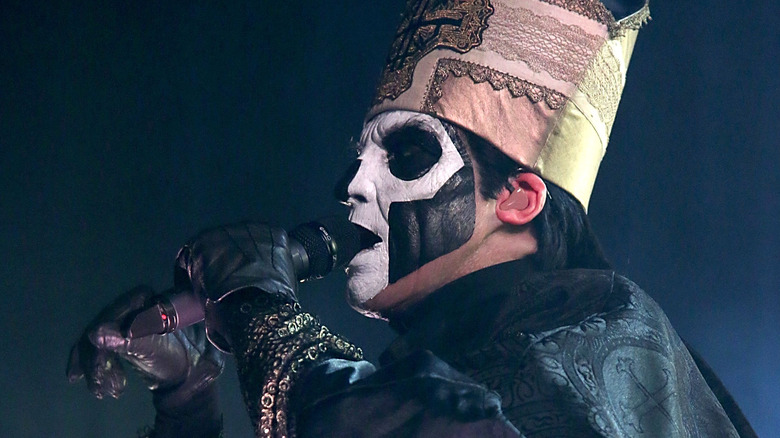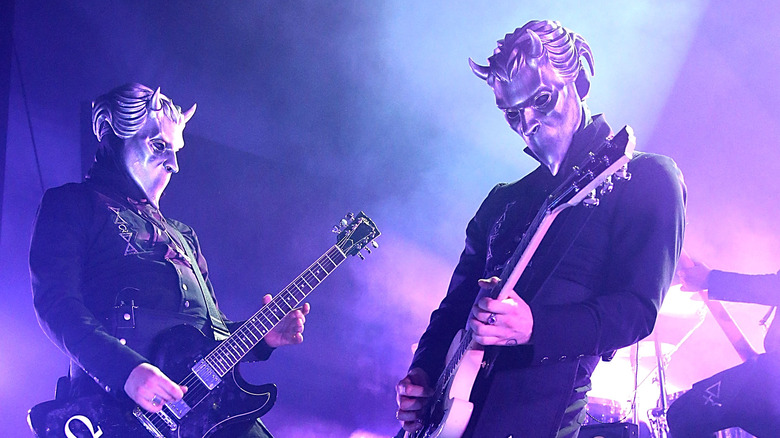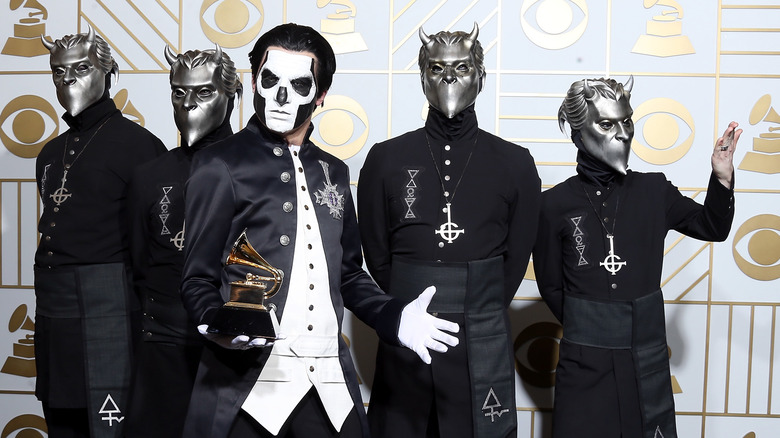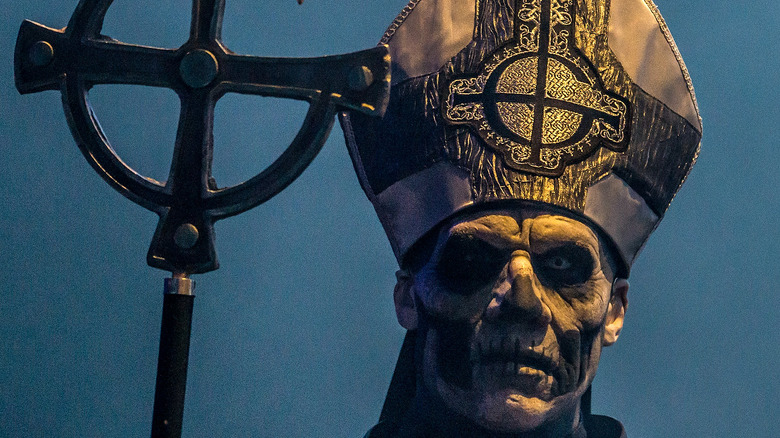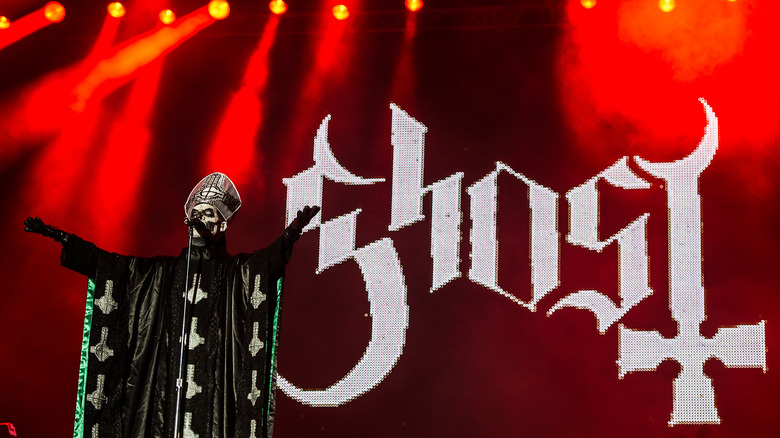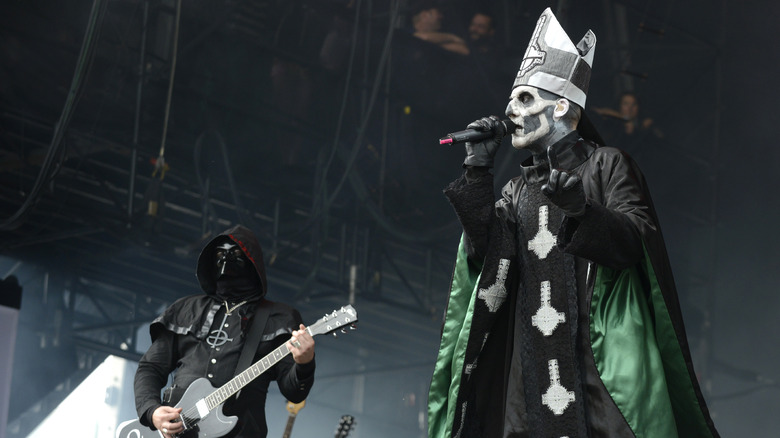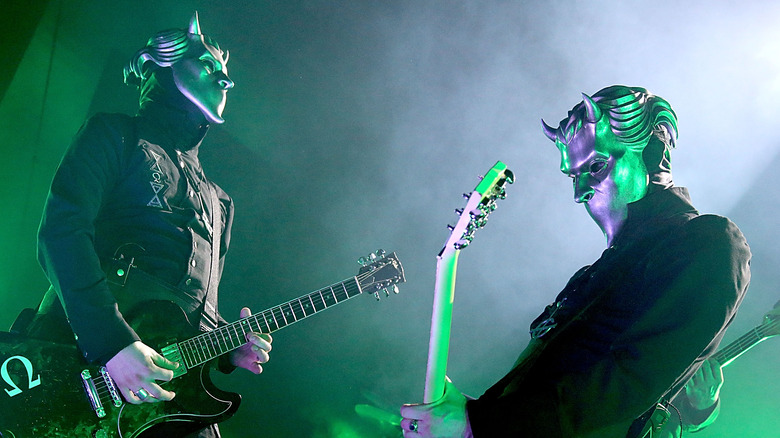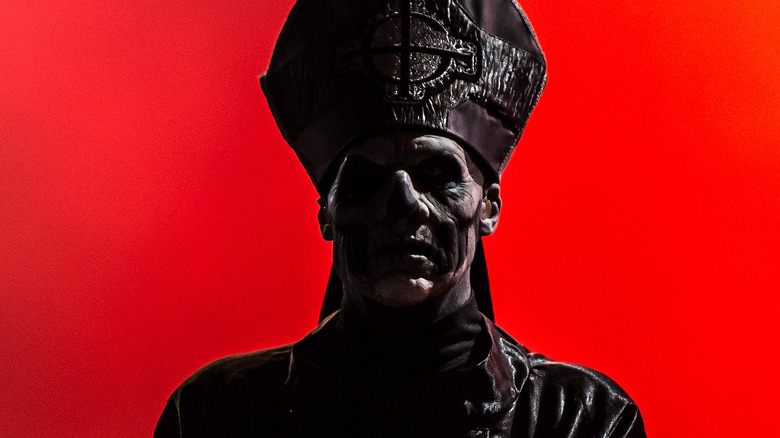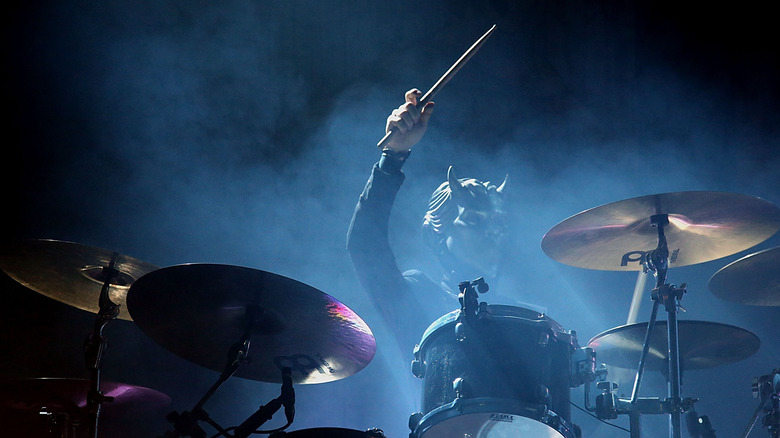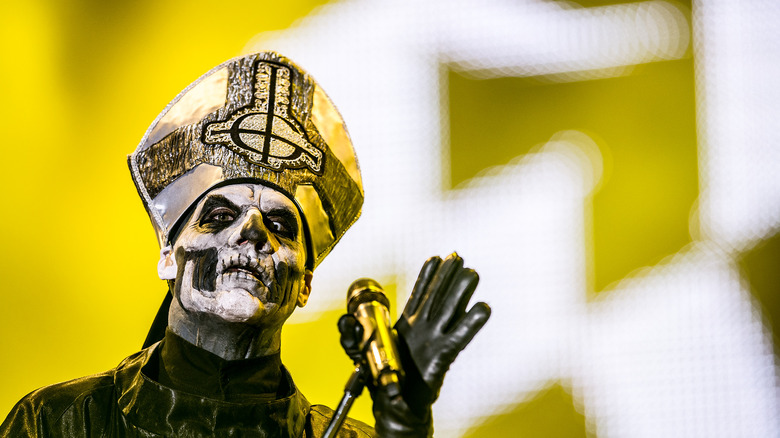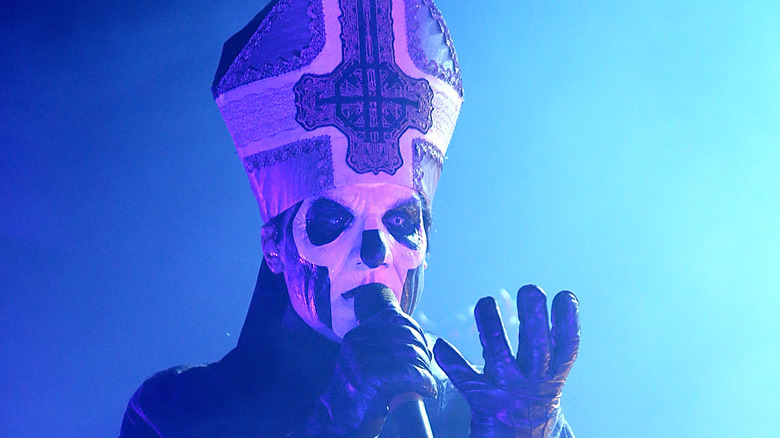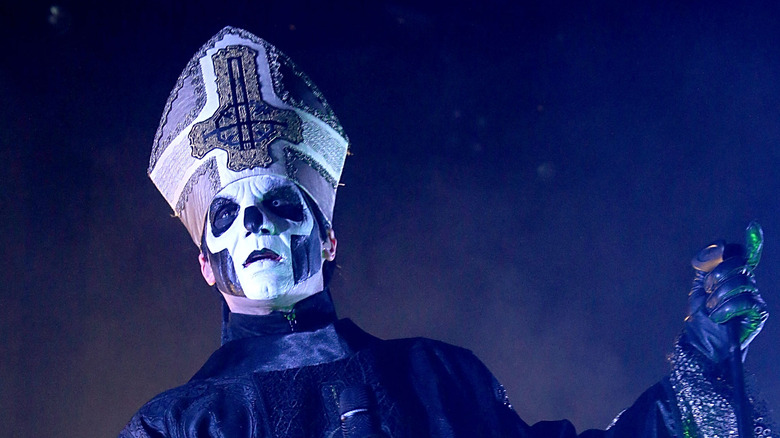The Untold Truth Of Ghost, The Swedish Rock Band
The Satanic Swedish metal band Ghost has been producing synthy, melodic anthems with witty lyrics since 2006. The band's videos and performances are theatrical and intentionally over the top, featuring an almost anonymous masked band and a frontman dressed as an occult pope with skeletal face paint.
As stated in The Independent, Ghost has released multiple critically acclaimed albums, won Grammys, and toured with some of the biggest names in rock and metal. While it might seem like they would be a niche band, the audience for kitschy Satanic rock is broad and international. The band's creator, Tobias Forge, has stated that their fanbase is highly varied, and it's hard to pin down what a typical Ghost fan looks like.
"Style-wise, you have the metalheads and the not-so-metal heads, and the pop girls," Forge told The Independent. "They like Star Wars, they like comic books, they like horror films. They like rock music with a slight nostalgia touch of the 70s and 80s."
The creator worked in a call center
Before playing a series of Satan-worshipping popes as the frontman of an increasingly popular band, Tobias Forge was involved with no less than five bands. As detailed by Loudwire, Forge was a guitar player for indie band Magna Carta Cartel and glam band Crashdiet, and he co-founded the pop-punk band Subvision and the death metal band Repugnant. Later, these bands (particularly Repugnant and Subvision) were analyzed by Ghost fans trying to determine the frontman's true identity. None were a big enough success to warrant Forge quitting his day job.
"Career-wise and [in terms of] fulfilling yourself and touring goals, it was definitely 29 years of what felt like non-activity," Forge told Revolver. He was working in a call center for a Swedish phone company when he created a MySpace page for what would become Ghost. "I think it said 'Ghost,' but from what I remember, it was a picture of a cathedral in the moonlight, and it just said 'Satanic doom' or something like that," Forge explained. Interestingly, he analyzed the demographics and tried to ensure that it reached fans of dark rock with a melody.
Forge created several Ghost demos, and he sang the songs himself. Originally, they were only intended to be guide vocals, but within two days, he was getting messages from managers and record labels all over the world who were interested in Ghost.
They're a Satanic band
The band appears as a variety of occult clergy and Nameless Ghouls, frequently singing songs about Lucifer, as well as monsters and historical figures like the Blood Countess. Ghost is a metal band with highly theatrical music, and some tracks, like fan-favorite "He Is" from the band's third album, are reminiscent of gospel sung in honor of the devil.
"As a young teen, Satan, and the idea of some sort of world that you could be in touch with that could empower you was very much the symbol for freedom," Tobias Forge is quoted as saying by Psychology Today. While he and his mother used to visit churches to appreciate their aesthetic, Forge's perception of Christianity was heavily influenced by his negative experiences with religious people at a young age. As Forge described in an interview with Revolver, his strict stepmother and "sanctimonious" authoritarian schoolteacher were both Christian and used their faith to justify their harsh behavior.
At the same time, young Forge became increasingly enamored with music that his beloved older brother introduced him to, including Siouxsie and the Banshees, Kim Wilde, and Kiss. With the '80s came a cultural fascination with Satan worship due to the (baseless) moral panic known as "Satanic Panic" (via The Guardian). This led to numerous Satan-inspired films, which Forge devoured. Per Revolver, he was drawing upside-down crosses when he was 10 years old and even bought himself a "black-magic grimoire."
They have a sense of humor
Ghost is intentionally elaborate and over the top. While they obviously take their music seriously, their goal is often to amuse their audience. From the beginning, the band has explained that there are no contradictions in a Satanic band making its listeners laugh.
"We are a very humorous bunch," a Nameless Ghoul from Ghost explained in an interview with Glide. They later added: "There is some sort of misunderstanding that everything diabolical is far from humor. It's supposed to be very serious, and I beg to differ. I think that if we want to be super Biblical ... from a hardcore, super Christian point of view, satire and laughter is a tool of the devil to trick people into not focusing on their suffering."
While the music, videos, and stage shows are often played straight, some of their songs and videos are less subtle in their satire than others. One of their songs titled "Kiss the Go-Goat" is a '60s throwback about having sex with the devil, depicted in the video as an elderly Satanic pope's nostalgic memory of his prime. In February of 2022, Ghost released a video referencing the famous romantic pottery scene from the 1990 film "Ghost."
The band's Catholic aesthetic is intentional
The band may have described religion as a "big problem" and "a very, very big danger" (via Blabbermouth), but Ghost's aesthetic is obviously inspired by Christianity, particularly Catholicism.
The band blends skeletal face paint and other Gothic looks with papal decadence. Even though he has been interested in Satanism, Tobias Forge has enjoyed the aesthetic of Christianity since he was a child. In an interview with Revolver, he explained that his mother was an art-lover and often brought him to admire the churches for their art and architecture, as one would a museum. He described one particular 1500s Catholic Church that captured his imagination, saying (via Blabbermouth), "It had that evil feel, with a lot of old, scary paintings and big stained glass windows."
Forge still admires the aesthetic of Christianity and uses it in the design of the band's look and in creating the elaborate characters that the group plays on stage and in videos, but that doesn't mean that he's a fan of Christianity. In an interview with Rolling Stone, Forge explained that he looks at Christianity as a fascinatingly beautiful but dangerous thing. "In the same way that I would not hang out with an alien from the film 'Alien,' but I love the look of it? That's my relationship with Christianity," he said.
The band has complex lore
While Tobias Forge has stated (via Metal Hammer) that the band's albums are not "a story that starts in the beginning and finishes at the end," Ghost has some of the most complex lore of any band. As detailed by Metal Hammer, the band portrays a variety of occult characters who are part of The Clergy, a secretive Satanic cult. The frontman is always a Satanic pope, but while they are all played by Forge, it is not always the same pope.
Ghost's first leader was Papa Emeritus I. His dark papal regalia was frequently accompanied by a swinging incense burner called a thurible, and his face appears to be a pre-made foam mask painted with skull-like makeup. He was replaced by Papa Emeritus II. As quoted by Loudwire, Forge gave an in-character interview introducing the new "ladies man" pope. Unlike his predecessor, this character occasionally appeared without face makeup. Papa Emeritus III, the younger brother of the previous pope, brought new costumes and erotic moves, but he was also soon replaced. Papa Nihil, who came next, is depicted as an older man, nostalgic for an earlier time in the Clergy. Papa Emeritus IV was introduced as the camp Cardinal Copia but was given an onstage papal inauguration.
The majority of the band appears as Nameless Ghouls, who are anonymous and masked. Videos sometimes feature the powerful leader Sister Imperator — but she has not yet performed with the band.
They kill off their frontmen
Ghost's Papas change frequently, and it's not usually a peaceful transfer of power.
The arrival of Papa Nihil and vocalist Cardinal Copia was accompanied by a video from the band titled "Ghost — Chapter Three: Back on the Road." In the video, Papa Nihil and Sister Imperator tell Papa Emeritus I, II, and III that they are going to be reinstated. Suddenly, a Nameless Ghoul in a demonic mask injects one of them with poison. The rest of the video features the bodies of the three previous Ghost frontmen being prepared for burial. The video ends with three boxes labeled "Papa I," "Papa II," and "Papa III" being shipped out in a black truck.
Papa Nihil survived the slaughter but was also killed off and replaced. During a live performance, Papa Nihil appeared to collapse, and Cardinal Copia was immediately promoted. As noted by Metal Hammer (whose cover once featured Copia holding the decapitated head of one of the dead Satanic popes), it's unknown if the new "Papa Emeritus IV" will survive his tenure, unlike all of the previous Ghost frontmen.
The touring band doesn't play on the records
"In every band I've ever had, every song I've ever written, I was always called a dictator, a control freak who couldn't work with anyone else," Tobias Forge told the St. Louis Post-Dispatch. "And I am a dictator and control freak. But I can work with people."
The band's current lineup includes Nameless Ghouls (and a couple of Ghoulettes) acting as guitarists, bassists, drummers, and keyboard players, while Forge acts as the group's various papal frontmen. The Ghouls who play the live shows are not the same musicians that can be heard on Ghost's albums, however. "I don't need necessarily other people to make ... records, except for the ones that I choose myself," Forge explained in an interview with Talking Metal (quoted via Theprp.com), "and I am a very determined tour artist, and I want the tours to be very good as well."
Forge plays all the instruments himself while writing the songs. For recording the albums in the studio, he has a favorite drummer and keyboard player that he likes to work with, but neither has ever been in the touring band. He also revealed that many members of the band have their own solo careers.
Ghost was anonymous
When the band started, the true identities of the bandmates were a carefully kept secret. As described in Revolver, after shows, the band members frequently greeted the audience unmasked, but fans respected their choice to remain anonymous and never took photos. Before Tobias Forge was revealed to be the band's creator and the man behind the various Papa masks, interviews were given by a Nameless Ghoul — which turned out to be Forge, wearing the same identical garb and masks that the rest of the band wore. Some fans did a significant amount of detective work trying to find out who the actual people behind the band were.
In 2016, a Nameless Ghoul explained to Blabbermouth that the easiest way to stay anonymous in the modern world is just not to be on social media. "Just don't update people. Don't have social media, and soon as anything is being said about you, don't comment," they said. Even when the band was still anonymous, it was hinted that it wouldn't always be that way. In the same interview, the Nameless Ghoul stated that there was more to a "clandestine image" than keeping your name a secret. "Even in the future, when it might not be as hidden, or as secret, I think that you can still uphold ... fog around you," they said.
The band's current lineup still includes Nameless Ghouls (and a couple of Ghoulettes) acting as guitarists, bassists, drummers, and keyboard players.
A lawsuit revealed their identities
Between dedicated fans trying to deduce their identities and hints that their names wouldn't remain hidden forever, the way that Tobias Forge's identity was revealed was highly unexpected. In 2017, the other members of the band accused Forge of not paying them what they deserved and sued him for kicking them out of the band. The Nameless Ghouls, some of whom had already revealed their actual names, also revealed Forge's name by naming him in the lawsuit.
As quoted in Metal Injection, Forge explained that the lineup (apart from himself) had changed many times since the beginning — because the touring band was exclusively a touring band, not the Ghost members who wrote or recorded the albums. Forge expressed regret that he hadn't put maintaining anonymity in their contracts (though in an interview with Blabbermouth, he considered the possibility that the expectation of performing without named credit might have contributed to the conflict).
The case against Forge was dismissed, and the band continued with a new touring lineup. Forge informed fans that he had always written the music alone, so there would be no change to the music. "I've been in charge and working on this full-time, nonstop, for 10 years," he told Colorado Springs Independent (per Blabbermouth). "Other people in Ghost would work a few hours every day, and then, during the four months between tours when I was making a record, they weren't really doing anything that had to do with Ghost."
Ghost has a pandemic album
Before the COVID-19 pandemic took hold of the world in 2020, Ghost released an album all about a plague. As stated in Rolling Stone, some have described it as predicting the pandemic, but Tobias Forge says it's just an example of history repeating itself. Forge told the outlet, "Everything in nature and time and our behaviors is very cyclical. It's almost eerie how we're basically repeating the 1900s again."
"I think this record might be the first positive record ever written about the plague," Forge stated in an interview with NME. The album, released in 2018, was called "Prequelle" and is about a plague. But the disease that Ghost sang about is more than an ordinary epidemic spreading from person to person — the story is also about the spread of contagious ideas. As explained by Forge, it's a story about survival, mortality, and if immortality would be worth it.
They're predicting the fall of empires
"When I made 'Prequelle,' my life was kind of shaky, but the world was ironically in a more steady place," Tobias Forge told Rolling Stone, "Whereas making the new record, I was in a very good place personally, but the world was the opposite."
After the accidentally prophetic plague album, Ghost released "Impera," which is about the fall of empires. Some have connected this to the 2022 Russian invasion of Ukraine (which had not yet occurred during the album's writing). As with "Prequelle," Forge told Rolling Stone that this as an example of history being cyclical, stating, "We have just gone through what would be an equal to Spanish flu in the beginning of 1918 and, currently, we are on the brink of what could become World War III."
That idea of history repeating itself is echoed in the book that partially inspired the album: "The Rule of Empires: Those Who Built Them, Those Who Endured Them, And Why They Always Fall," which discusses empires from Ancient Rome to the modern-day. Forge described the album to Rolling Stone as not being about any particular empire, but the "concept of empires and their self-destruct mechanisms." Despite this, fans have been quick to notice references in the lyrics to specific political figures, including Donald Trump and Mike Pence. As described in Metal Hammer, the song "Griftwood" describes individuals who use religion as a tool to gain power when, in reality, they are hypocrites who don't believe what they preach.
Ghost uses history to talk about current events
While Ghost's albums are sometimes coincidentally prophetic, they explicitly reference the past in many of their songs. That doesn't mean they are only interested in history, however. As stated in an interview with The Independent, the final track of "Impera" is set during the time of Jack the Ripper's murders in London. Tobias Forge explained that he is drawn to the Victorian era not only for its aesthetic but also because he feels that there are parallels to modern times. Forge told The Independent, "It's similar to today in the sense that the world was also going through a big industrial revolution."
In an interview with Loudwire, Forge commented on current events, viewing Russia through the lens of empires that always eventually fall. He stated that people have become distanced from the "cyclical nature of everything," so they are shocked by "something as barbaric and old-school as war and the threat of war and the threat of authoritarianism and Biblical wrath or pandemics."
